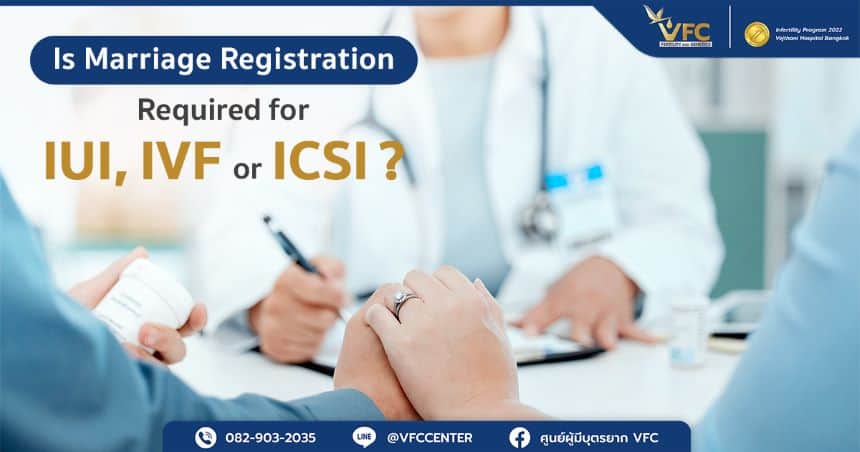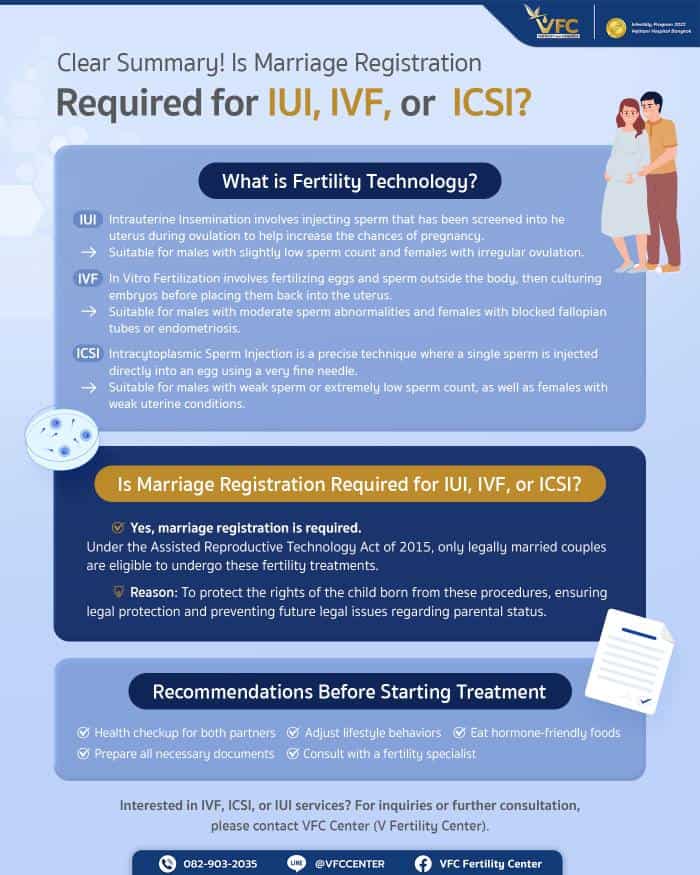
Fertility technologies like IUI, IVF, and ICSI have become a beacon of hope for couples facing infertility, with a common goal: “to have a child and complete their family.” However, one crucial question many couples ask is, “Is marriage registration required for IUI, IVF, or ICSI?” While medical procedures can help couples conceive, the legal aspects and rights of the child born from these treatments directly impact their future lives. Therefore, understanding the related legal requirements is essential and should not be overlooked.

What Are the Processes for IUI, IVF, and ICSI?
There are various fertility technologies available today, each with its unique advantages and suitability. Doctors assess each case to determine the most appropriate method.
IUI (Intrauterine Insemination): Injecting Sperm into the Uterus
IUI is a fertility treatment where sperm, after being screened, is injected directly into the woman’s uterus during ovulation to increase the chances of natural fertilization. It is suitable for couples with overall good health, but where the male partner has a slightly low sperm count or motility, or the female partner experiences irregular ovulation.
IVF (In Vitro Fertilization): Test-Tube Baby
IVF is a process where eggs and sperm are fertilized outside the body, and embryos are cultured before being implanted back into the uterus. This treatment is ideal for couples where the male partner has a low sperm count or issues with sperm ejaculation, and the female partner has blocked fallopian tubes, endometriosis, or ovulation problems.
ICSI (Intracytoplasmic Sperm Injection): Injecting Sperm Directly into the Egg
ICSI is an advanced technique where a single healthy sperm is injected directly into an egg. It is suitable for cases where sperm have severe issues such as poor motility or extremely low count, or when the female partner has a low egg count, hardened egg shells, or weak uterus.
Is Marriage Registration Required for IUI, IVF, or ICSI?
According to Thai Law: Marriage Registration Is Required
In Thailand, whether for IUI, IVF, or ICSI, couples must be legally married. According to the Assisted Reproductive Technology Act of 2015, it is explicitly stated that only legally married couples are allowed to access fertility treatments. This ensures the protection of the rights of the child born through these procedures and ensures the legitimacy of the medical facilities providing the service.
Required Documents
When couples decide to undergo fertility treatments, they must prepare the following essential documents:
- National ID cards of both partners
- Marriage certificate
- Name change certificate (if applicable)
Can Same-Sex Couples Undergo IUI, IVF, or ICSI?
Currently, Thai law does not support fertility treatments for same-sex couples, even if they are legally married.

How to Prepare Before Undergoing IUI, IVF, or ICSI
Preparing both physically and mentally is vital to ensure the best outcome and increase the chances of success in fertility treatments.
Health Checkup for Both Partners
Both partners should undergo a health checkup to assess reproductive health. This includes sperm tests for the male partner, as well as checks for the uterus, ovaries, or any genetic conditions that may hinder pregnancy, such as cysts, endometriosis, or sexually transmitted infections.
Adopt Healthy Lifestyle Changes
Avoid behaviors that negatively affect sperm and egg quality, such as smoking, excessive alcohol consumption, late nights, and stress. Incorporate healthy activities, such as light exercise and sufficient sleep.
Eat a Balanced Diet
Focus on foods that support reproductive health, such as leafy greens, eggs, whole grains, Omega-3-rich fish, and avoid processed foods, fried foods, and excessive sweets, as they may disrupt hormone balance.
Prepare Legal Documents in Advance
Legal documents are just as important as health checks. Make sure all necessary documents are ready to prevent delays in the treatment process.
Consult with Your Doctor
Discuss your health history and treatment history with a reproductive medicine specialist to determine the best approach, whether IUI, IVF, or ICSI, and to effectively plan for pregnancy.
Summary: Is Marriage Registration Required for IUI, IVF, or ICSI?
The answer is “Yes” if you want to undergo treatment legally in Thailand. Marriage registration is required not only to comply with medical facility regulations but also to fully protect the rights of the child born from these processes. Therefore, preparing both legally, physically, and emotionally is the key to successfully achieving parenthood.
If you’re wondering where to undergo IVF, ICSI, or IUI treatments that are safe, trustworthy, and empathetic toward your desire to have a child, feel free to consult with us at VFC Center (V-Fertility Center), your trusted fertility specialist in Thailand. We are here to guide and care for you, providing comprehensive IVF, ICSI, and IUI treatments, with a team of doctors who are dedicated to your physical and emotional well-being, ensuring you a reassuring path to parenthood.
Contact or Book a Consultation:
VFC Center – V-Fertility Center
Hotline: 082-903-2035
LINE Official: @vfccenter

The team of specialists in obstetrics and gynecology and reproductive medicine





No Comments
Sorry, the comment form is closed at this time.